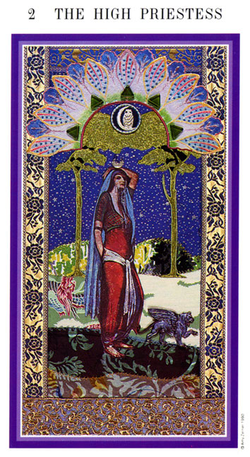 This week's card, The High Priestess, is about our unconscious knowledge - unearthing the secrets of the universe, and recognizing that they were part of us all along. If we're all a part of everything, and everything is a part of us, then understanding the world starts with ourselves too. It's about trusting our instincts, tapping into our feelings, and believing that our thoughts have worth.
Have you ever heard the phrase "you don't know what you don't know"? The idea is that while intelligence is important, it's not admitting when you're ignorant that gets you into trouble. And I agree, in theory, but I think there's more to it than that.
Nobody knows everything. Nobody's instincts are absolutely perfect, every time, because without mistakes there would be no growth. But ultimately I think people know what they don't know - and know what they need, too.
I believe we know more than we think we do. We examine where we're lacking and often sell ourselves short. We're cautious to a fault because we doubt our true instincts. And we deny ourselves the things we want, because we're afraid we're being selfish, or overestimating their value.
When someone tries to come from a place of ego, to pretend they understand it all and can do no wrong, that's not out of a failure of instincts. It's because that person doesn't trust themselves or their decisions. They have to be that much more closed off to new information, because truly listening to themselves - to why they feel something, and what they're afraid of happening if they get it wrong - is something they don't yet understand.
Think about the knowledge you claim to hold. Is it coming from a place of ego and fear? Or is it from a place of trust in your internal landscape? Is it in the spirit of constantly being in touch with yourself and the world around you?
What's your biggest challenge in listening to your instincts? Let me know in the comments!
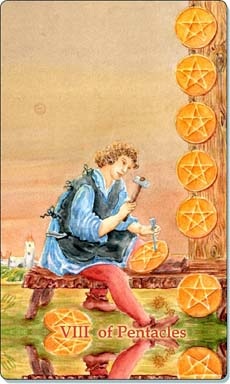 A lot of people look at Tarot as a way to go deeper into their own lives. That's what I do: helping people shed light on the patterns and energies in their lives, giving them a better look at where to go next. But what I love about the cards is they can be so versatile. Sometimes even a day-to-day question can get you strikingly specific results.
The time I couldn't get in touch with a friend, for instance, so I consulted the cards and drew The Moon (needless worry) and the Four of Wands (a celebration). She was at a festival that day, and couldn't get to her phone. Or this weekend, when my computer was being an absolute delight, and I hadn't heard from my tech support forum of choice for hours. The Magician told me I had the tools I needed to tackle it myself, and while I didn't fix everything, I did manage to get my Internet back online.
Of course, it's probably not always going to be effective if you rely on a deck of cards to tell you what to have for dinner tonight. But it makes for an interesting way to flex your reading muscles. Part of being an effective reader, after all, is letting your intuition stretch you just beyond the classic meanings of the cards into a new mode of thinking. (How would you use the cards to decide what's for dinner? Six of Cups means a favorite childhood meal? The Tower means something spicy with bold flavors?)
It's not good to let Tarot do all your thinking for you, of course, and it's an easy trap to start relying on it too much. Ultimately everything should rely on your own decisions and common sense. But give the Tarot a spin for an unusual question sometime, and see what muscles it flexes in your mind. It just might surprise you.
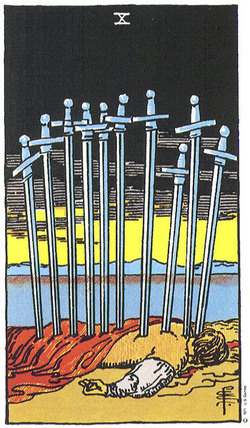 Have you ever encountered something that just makes your eye start twitching and your fingers start drumming? The kind of thing where no matter how much you try to practice non-judgmental bliss, it can sometimes just get to you? Here are a few things I've seen in Tarot that get under my skin.
1. "Gypsy" fortune teller acts. First of all, "Gypsy" is actually a really insensitive word. A lot of people don't know this, so don't feel horrible if you used it up to now or anything. But it's a big-time slur in Europe, and it isn't even accurate, considering it was used to refer to the Romani people because they "looked Egyptian" and no one could be bothered to ask them for the facts. Kind of like "Indians" referring to Native peoples in North America.
The actual semantics aside, if you're reading Tarot more for the entertainment than the counseling angle - and that is totally fine, seriously, as long as you make it clear that's what it is - then you can probably find a sparkly costume to do it in without an accent and the words "cross my palm with silver." Come on, guys. There are like six stereotypes that plays on, and not enough people know what they really refer to.
2. "Bad" cards. People who are reading for themselves tend to do this. A reversal is "bad". The high Swords cards or the Tower are "scary". The Star in the "what to watch out for" position means "you are heretofore advised to throw yourself into a pit of despair and never be optimistic again."
You can read everything super-literally if you want, and I get it if you want the cards to just serve up a slice of truth: "No, the job probably isn't on the way. And also you should probably look out for the bolt of lightning that's going to shake your world up. Just warning you." But I feel like I'm watching a mime box himself in. The problem isn't how you're reading, when you do it this way, it's how you're responding to what it says. I honestly can't, in my heart of hearts, believe your inner guidance and a hand from the Universe is simply saying "Your life will suck right now."
Why is there going to be a bolt from the blue, or a feeling of total despair? You're never helpless in your life, and rarely does anything just happen to you, so determine what's going to show up in your world and decide how you want to feel about that. Adjust circumstances accordingly. Maybe you're not supposed to get the job because there's a better one on the way. Or the sudden, painful revelation will lead to you reinventing your world in a way you'd never have been able to before. Tarot is never just about things happening to you. It's about looking at the road you're on, where it's leading, and if you want to change direction.
3. "They're doing it wrong!" Yes, before you ask, I see the irony here. But seriously, I can't stress this enough. Yes, there are close-minded ways of catering your reading to exactly what you want to hear, or responding to your reading from a place of fear. And that's not good for your learning, or what you get out of reading Tarot. But I'm talking about the methods you pick up and the teachers you choose. There is no end-all-and-be-all as far as that's concerned. The only way you could possibly be "doing it wrong" is if you learn one way, stop there, and refuse to learn anything else. The more information you gather, the more you can decide for yourself what's worth doing and how.
But, here's the real reason for this one: even if you work for years and decide the best way to learn or teach or read the cards or whatever else, please don't be a jerk about it. I have seen a few Tarot experts and instructors call each other out, often by name. I've seen them get judge-y for having a different opinion, teachinga certain way, charging a certain amount of money. I can't think of anything that turned me off faster than watching a seminar from an instructor, and listening to them smugly outline how their teaching was superior to someone else's book.
Everyone learns differently. Everyone responds to the cards differently. Don't limit yourself by stereotypes, by fear, or by inaction. But most of all, don't ever limit someone else by telling them there's only one way to tap into the cards. Tarot is far too elaborate, magical, and full of potential for that.
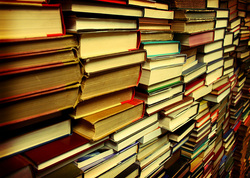 When I was searching through Tarot articles for new information to share with you guys, I stumbled on something that really made me twitchy. In one article geared towards learning to read the cards for beginners, I saw an author saying it might be too confusing for a beginner to read multiple books on the cards, because it might lead to conflicting meanings.
And my first thought was: so what?
Here's the thing about Tarot meanings - they evolve, based on the reader, the deck, the author, the school of thought, the time of the writing. Saying that "conflicting ideas" will confuse you is like saying there's a right answer in the first place. But worst of all, it's like saying you can know too much.
I'm a bookworm and, showing my nerdy roots again, a Ravenclaw at heart. I can't think of anything you could possibly read too much on. You should always, always strive to learn as much as possible - or you'll get locked into one meaning, and unable to be flexible when the need serves. When you're reading for yourself or for someone else, you'll find a meaning for the cards that just doesn't fit the rest of the reading, unless you're willing to think outside the box a little bit or go with your gut. Saying that's "too confusing" is like assuming you can't think hard enough to read the cards in the first place.
There are things to watch out for, of course. Don't scatter your energies and try to tackle too many books at once without absorbing all of them. Don't take anything as gospel without examining why one author feels one way, and another might feel a different way. Don't fail to recognize real, historical facts, because Tarot's genuine evidence-based history shows a lot about where it came from and helps you appreciate how it evolved.
But there's never too much information. There are only ineffective ways of absorbing it.
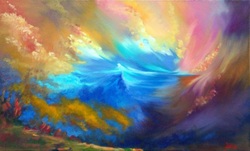 There's so much more to intuitive thinking than just psychic readings and spirit guides. While that's the end goal, developing yourself and your mind so you can be more in touch with the universe, here's a few things developing your intuition can teach you along the way. (image is "Intuition" by Bente Hansen) - Pay attention. The world has so much to say to you if you look around and see what it's telling you. You have so much to say to you, if you only tune in. If you learn to listen, you'll be open to more points of view and more possibilities.
- Slow down. We're so wrapped up in the world around us that we don't always take time to really see and feel what we're doing. Slowing down puts us in touch with our own bodies, with the things we want and need - which means we can take care of ourselves in a more profound way.
- You know more than you think you do. Gurus can point you in the right direction, and you can learn a lot from an outside perspective, but ultimately you're just as in touch with inner wisdom as everyone else. If you believe you'll see results from trusting your instincts, then you will, whether that's achieving your heart's desire or learning more about yourself to make it happen.
- The world is out to give you good things. Really. Even when everything is going horribly. There are no "bad" cards in Tarot, and there are very few 100% "bad" events in life. Our mistakes and our tragedies are tools to learning and developing into something greater than we are. Listening to your intuition means you have an internal guide all the time telling you how and why that is, and it makes the true lessons of the moment far easier to access and believe.
- You are magic. Listen to your intuition, and you'll realize all the miraculous things you've seen in movies are already part of you. As you unlock more and more of your own psychic potential, you'll realize that all the incredible things you ever wanted to do were already there to begin with, waiting for you to bring them out. Will you have natural talent to be an expert at everything? No. But you'll have access to it - to learning lessons from it, tapping into it, and growing from it. And you can make anything you want a part of the magic of your world.
"And you who seek to know Me, know that the seeking and yearning will avail you not, unless you know the Mystery: for if that which you seek, you find not within yourself, you will never find it without.
For behold, I have been with you from the beginning, and I am That which is attained at the end of desire." - The Charge of the Goddess, Doreen Valiente
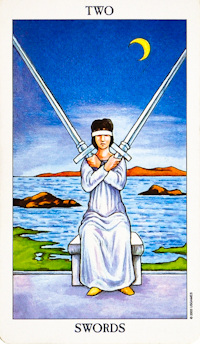 When you're first starting out while reading Tarot cards, there's a tendency to second-guess yourself. I can still remember all the things I used to say to myself in the beginning. "I haven't shuffled enough, that's why this card keeps reappearing." "There's too many reversals for this to really be accurate." "I really need to learn to shuffle better, a card just flew out from the deck mid-way through. Now I can't possibly draw it or it's a biased reading in some way." Here's the thing: in Tarot, there aren't really mistakes.I'm not saying you can't give a bad reading. And not everyone's going to agree with me - I remember Dan Pelletier's "The Process" saying that once a card flies out of a deck during shuffling, "you've lost all credibility with your sitter," and I can understand exactly why he'd say so. But I also remember The Devil practically shooting out from my hand during one shuffling. And I proceeded to lay it on the table, and ask if addiction had recently come into play for my sitter. As it turned out, her son was in prison for some of the things he'd done while on drugs. I pay attention to the cards that shoot out of my hand as additions to the reading now, and it never fails. Repeating cards? Those are a capital-M Message for you, one you need to really grasp the meaning of when they show up. They'll haunt you across multiple decks until you really figure it out. Too many reversals? Maybe see reversals in a different light for this reading - as cards that are blocked/scattered energy, or energies you need to pay attention to. Ask three Tarot readers and get five different answers. But the important thing here is that Tarot reflects what's going on in the world, and inside you, so it's a beautifully adaptable tool to whatever might happen. What's important is really your reaction, the connections you make. Your mistakes might tell you more about your question than a reading that's perfect, smooth sailing. Agree? Disagree? I'd love to hear your personal interpretation of events like these in the comments!
 If you ask witchy types what a "Fluffy Bunny" is, you'll get a hundred different answers.
They talk about white light, and the people who hate them are just cynical jerks. They talk about white light, and judge anyone who shows anger or pain. They judge spiritual paths that are too "scary". They're too accepting of just about anything in their spiritual path, without doing the proper research and work. They trust authors that are inaccurate - no one can agree on which authors, mind you, or just what the inaccuracies are .
Really, the only way I made peace with my fear of being a "fluffy bunny" was when I ignored the conversation altogether. Historical accuracy was something I could gauge, so I checked if that was up to snuff, and the rest? Whatever works for you. And it all seemed to, so why should I care?
But a few weeks ago, a conversation popped up about Tarot that brought the whole idea into my thoughts again. The heated debate went: Tarot has been used to teach spiritual mysteries, and has been part of a lot of magickal ceremonies. Now, it's mostly used for "fortune-telling". Has Tarot been turned into a fluffy New-Agey oracle? Has the "real" meaning of things been corrupted somehow?
I mainly rolled my eyes and ignored the whole thing, as more people slowly broke in: intuitive Tarot isn't as "meaningful." Just teaching the symbolism and magickal meanings aren't as "accurate." And my favorite: we all needed to "admit" that intuition wasn't real, was just an element of our imagination, that there's no such thing as psychic development. Only then can we grow spiritually.
And I thought: Seriously, guys? Seriously? You just talked about the names of God and the angelic correspondences to the Tree of Life, and you're an authority on whether something is made up or not? We work with the Platonic elements and robes and magic wands. We discuss the meaning of 78 pieces of artwork printed on card stock. Most people think we're ridiculous.
And even if you don't, and you're the most mainstream Judeo-Christian out there: someone still thinks you're just talking to imaginary friends.
The human mind is so vast, so varied, so full of thoughts and ideas. Patterns and symbols and stories, they're part of how we learn and grow. That's what Tarot is all about: seeing what story the cards tell you, and using it to inform your life and the choices you make. So unless you are flat-out inventing stuff, or appropriating cultures and passing it off as "authentic", your spiritual life? None of my business.
If you want to develop as a psychic, a witch, a Tarot reader, or even just a spiritual person, there are three whole things you have to do:
- Learn as much about what you want to know as possible.
- Practice it.
- Don't be an ass to people who do it differently.
Tarot's a giant spiritual metaphor, a psychic springboard, a set of journaling prompts, the Book of Life, a storytelling kit, a card game, and a set of 78 pieces of artwork. But really, it's a tool. Your magickal, fantastic mind does the work. And that's as it should be.
How do you Tarot? And what are your thoughts about fuzzy little lagomorphs and the hardasses who love them? I'd love to hear your thoughts!
|







 RSS Feed
RSS Feed

